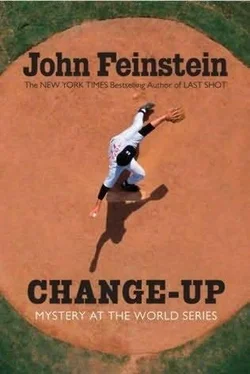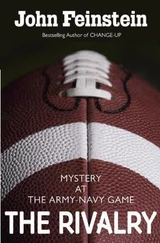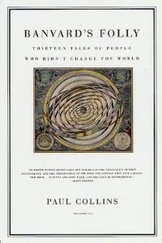“Oh my God,” Susan Carol said, the truth hitting her at the same instant it hit Stevie.
“I agreed,” Doyle said, starting to sob. “Analise might not have been as drunk as me, but she’d probably never driven drunk in her life. We’d gone a couple miles when we came around that curve too fast and…”
His voice broke up and he buried his head in his hands.
“Feel pretty good about yourselves?” Felkoff said low in Stevie’s ear.
“Shut up, Felkoff,” Stevie said. “You’re not helping.”
Susan Carol had her arm on Doyle’s back.
“So, Analise was driving when the accident happened?” she asked softly.
He looked up at her, tears rolling down his face. “Do you understand?” he said. “If I’d been driving, we probably would have gotten home okay. But I didn’t want to take that sobriety test. A DUI would have got me suspended, heck, maybe released. It wasn’t like I was pitching all that well. So she drove. And she lost control of the car.”
“But the police report?”
“I asked Jim not to tell anyone Analise was driving. It was my fault, and I didn’t want the blame to fall on anyone but me. I never even told Jim that Molloy pulled us over… I don’t know if he knows…”
“Do the kids know? Any of this?” Stevie asked.
Doyle shook his head. “No. When they were little, I told them there was another car involved-it just seemed easier than the complicated truth. When they were older and figured out that I went to rehab right after the accident, well, I’m sure they put it together. I’ve told them some of my memories about the accident scene because they seemed to need to know, but I’ve never told them all that led up to it. And I certainly never told them Analise was driving. Now I guess they’ll know everything.”
“Not if they can’t prove you said all this,” Felkoff said. He reached down suddenly and swiped both tape recorders off the bench and began running. Stevie jumped off the bench and chased him. It wasn’t hard to catch him-Felkoff was overweight and over forty. Stevie tackled him halfway across the minipark, and they rolled in the grass.
Stevie saw one tape recorder fly out of his hand. He twisted Felkoff’s wrist and heard him scream in pain. Then Felkoff kicked him in the stomach, and it was Stevie’s turn to yell in pain.
Then, all of a sudden, someone was pulling Felkoff off of him. Had Susan Carol been able to call Kelleher that quickly?
No. Stevie looked up and saw Felkoff struggling in Norbert Doyle’s arms. “Stop it, David,” Doyle said. “Look at yourself. It’s not worth it. It’s over.”
He looked at Stevie, who was sitting up with a bad stomachache.
“Write the story,” he said. “Twelve years of lying is enough.”
Susan Carol was standing right behind him-with the tape recorder in her hand-and Stevie could see Kelleher and Mearns sprinting toward them.
Doyle pushed Felkoff out of his grasp, turned, and walked away.
DAVID FELKOFF DUSTED OFF HIS SUIT, glared at everyone, then took off after Doyle without saying another word.
“What the hell happened?” Kelleher asked.
“Let’s go back to your room and we’ll tell you,” Susan Carol said.
As they walked back, Kelleher couldn’t help but tease Stevie about his inability to conduct an interview without getting into some sort of fight. “Let’s see, you’ve been chased down by a dog, been slapped by a girl, wrestled with someone in Faneuil Hall, and tackled an agent,” he said as they headed up the escalator to the lobby. “In all, a pretty good week.”
“Can’t wait to hear your parents’ reaction when you tell them about it,” Susan Carol put in.
“Oh sure, I’m going to tell them,” Stevie said. “That way the next time I cover a sports event, I’ll be thirty.”
She put an arm around him for a moment and said, “Would it help if you tell them I’m proud of you?”
“Doubt it,” he said, but he wrapped an arm around her too, and that did help.
They walked Tamara and Bobby through the entire meeting and played them the tape, in part to make sure it hadn’t been damaged during Stevie’s tussle with Felkoff. When they were finished, Kelleher looked at Mearns and said, “What do you think?”
“I think it’s a pretty tragic story. And a tough call,” Mearns said.
“You mean whether to write the story at all, don’t you?” Susan Carol asked.
Kelleher stood up and walked to the window, gazing out at the harbor for a moment. Then he turned and faced them. “Look, you guys have done an amazing reporting job on this,” he said. “Stevie, you’ve done everything but go to the hospital to ferret out the truth.”
“Give me a little more time and I can probably oblige,” Stevie said, forcing a smile. He wasn’t sure where Kelleher was going, but he was pretty sure it wasn’t going to make him happy.
“There are two questions you have to ask when you publish a story, especially a story like this one,” Kelleher continued. “First: is it true? The answer there is easy. You’ve got the truth, you’ve got it from the main source, and you’ve got it on the record. The story won’t even need to be lawyered. You’ve got Doyle on tape telling you what happened that night.”
“And the second question?” said Susan Carol.
Kelleher sighed. “Is a lot more complicated. Is it necessary? Does the story serve a purpose?”
Stevie had been wondering about that one since his first trip to Lynchburg. But now that the hard-won truth was in their hands, he didn’t want to give up on it.
“Of course it’s necessary,” he said. “Doyle lied about his past. If he’s selling his story to Disney or DreamWorks and it isn’t true…”
“Exactly right-we shouldn’t let him do that,” Kelleher said. “That’s the reason the story was worth pursuing in the first place. But what if he’s not? What if, after this morning, he tells Felkoff to buzz off. What if he decides to tell the truth: that he’s a recovering alcoholic and that he’s always felt responsible for Analise’s death?”
“You mean leave out the rest?” Susan Carol said. “Leave out the fact that she was drinking that night too, and that she was driving because Molloy made her drive?”
“That’s the part I wonder about,” Kelleher said. “Did he lie? Yes. Did Hatley lie on the report? Yes. But why did they do it?”
“To protect the kids later on,” Stevie said.
“To allow them to remember their mother in the best way possible,” Susan Carol added.
Kelleher nodded. “That’s not evil. This isn’t a team owner covering up drug test results. It certainly isn’t blackmailing a basketball player or faking a kidnapping.”
“It’s a lot easier when it’s clear-cut,” Stevie said.
“Good-versus-evil stories are pretty simple to write once you’ve got them,” Susan Carol said.
“Right,” Kelleher said. “Do either of you think Doyle is evil?”
“No,” they both answered, Stevie with some extra vigor, remembering Doyle pulling Felkoff off of him.
Tamara had been quiet throughout the conversation, letting Kelleher lead Stevie and Susan Carol to what he clearly thought was the right decision.
“It’s still not that simple, though, is it, Bobby?” she said. “Is it fair to hold things back from the public-to only tell part of the story?”
“That’s a damn good point,” Kelleher said. “You and I both know there are times reporters hold back things that are personal as long as they don’t affect what the person does in public: a child with a serious health problem; a marriage in trouble before either person files for divorce; a mistake made years ago.
Читать дальше












